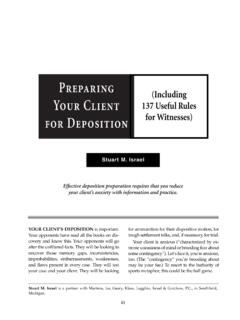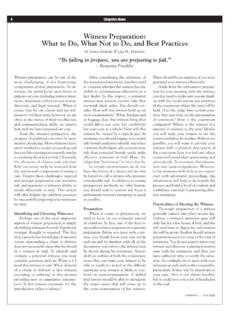Transcription of Defending Your First Deposition - Siprut PC
1 LITIGATION 101: Defending your First Deposition by Joseph Siprut1 Defending your First Deposition is an exciting milestone in the career of any young litigator. Though you will not be taking the Deposition , do not be lulled into thinking that no preparation is necessary. The following checklist will help you cover the bases in preparing to defend your First Deposition . PREPARE your WITNESS. If you are Defending your client s Deposition -- or an agent of your client -- you should insist on a preparation session. Anything you discuss in preparation for your client s Deposition is protected from disclosure by the attorney-client privilege. If the deponent is a third-party unrepresented by counsel, you may try and communicate with them, but your communications are not protected -- , if the adverse lawyer asks about the content of your communications during the Deposition , the third-party must answer truthfully.
2 In your preparation session, cover the following points: When you begin to speak or formulate objections, the witness should stop talking. Along the same lines, tell the witness to pause before answering all questions. Not only will this give him time to think, but it will give you time to interpose an objection, if appropriate. Explain that this Deposition is not the witness s time to tell his story. The time for that is at trial. The Deposition is the opponent s chance to try and get information that will support his case; thus, the witness should make that lawyer work to get that information. Don t volunteer anything.
3 If the questions is: do you have the time?, the answer is yes, not three-o-clock. The exception to the previous point is if, for strategic reasons, the decision is made to show your cards and demonstrate the strength of your case in order to extract an early settlement offer. In such a scenario, it may indeed be better for the witness to tell his story at the Deposition and volunteer information he otherwise should not. Explain to the witness that there is a difference between I don t know and I don t recall answers. If the witness doesn t recall something at the time of his Deposition , he can always remember by trial.
4 1Mr. Siprut is an attorney at Novack and Macey LLP in Chicago, Illinois, where he focuses his practice on commercial litigation. He is also a member of the American Bar Association Young Lawyers Division, including the Litigation Committee. #82776 1 Tell the witness that if he needs a break during the Deposition , he should ask for one -- as long as there is no question pending. If you as the lawyer want to ask for a break -- whether it be to get a cup of coffee or to discuss strategy with the witness -- explain that the witness should not disagree with you and say he doesn t need a break.
5 If you say a break is needed, it s needed. Remind the witness to be polite and likable. The better a witness the other side thinks he will make, the more they will fear him. A good pedagogical tool: tell the witness to imagine the opposing lawyer is his father-in-law and they re meeting for the First time. Above all, calm the witness by telling him you will protect him during the Deposition , and that there is nothing to worry about. DURING THE Deposition . During the Deposition itself, adhere to these general guidelines: Object when appropriate. Write the objections permissible at a Deposition in the margin of your notes, and voice them when appropriate: form; misstates facts; mischaracterizes prior testimony; argumentative; relevance; calls for a legal conclusion; and attorney-client privilege.
6 Review the pertinent court rules or status regarding any other privilege that you may need to assert, such as the confidential marital communication privilege. Note that even when you object, the witness must still generally answer the question. The one notable exception to this point is when you object to a question on the ground that it calls for information protected from disclosure by a privilege, such as the attorney-client privilege, -- in that case, instruct the witness not to answer the question. If the witness starts to ramble, you can interrupt with: just answer the question. If opposing counsel becomes abusive during the Deposition , describe for the records the conduct that is occurring -- , counsel is standing and shouting at the witness, etc.
7 Threaten to walk out if the conduct continues -- and do so if necessary -- but First try and resolve the problem. Never waive signature if you re Defending a Deposition . Always reserve signature and give your witness a chance to correct any errors in the transcript. When opposing counsel finishes his questions, you have the right to ask questions of your own. Consider beforehand what questions may be appropriate and necessary, and make a note during the Deposition if there are any areas of testimony you need to explore. Finally, as a general point, try and observe more senior lawyers in your firm Defending a Deposition before you jump in the water.
8 Understanding the theory of Defending a Deposition goes a long way, but to be fully prepared, there is no substitute for seeing these principles in action. #82776 2










